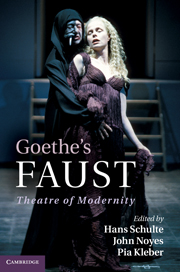Preface
Published online by Cambridge University Press: 01 June 2011
Summary
In the summer of 2000, the World Exposition in Hanover, Germany, presented visitors with an extraordinary experience: Peter Stein's uncut production, in twenty-three hours of stage time, of one of the most massive pieces of world literature ever written. Johann Wolfgang von Goethe dedicated over sixty years of his life (1749–1832) to the composition of Faust, a Tragedy in two parts. The production, which moved on to Berlin and Vienna over the next two years, was timely indeed: many other productions followed. Faust was rediscovered not only as a vital document of Western cultural memory, but also for its unsurpassed prophetic power. A major symposium in Toronto, Canada, and the development of this book were meant to take these discussions to the next, international, stage.
Obviously, there are numerous translations of Goethe's Faust. Unless cited otherwise, our default translation is that of Stuart Atkins, Faust i and ii, Cambridge, MA: Suhrkamp, 1986. We have tried to maintain the flow of the text by keeping the original German to a minimum. What we have lost in philological precision we have gained in readability. But we allowed Goethe's full poetic text to stand in the longer, indented quotations. This poetry counts among the most sublime in the history of European literature, and the richness of its music and associations remains ultimately untranslatable.
- Type
- Chapter
- Information
- Goethe's FaustTheatre of Modernity, pp. xi - xiiPublisher: Cambridge University PressPrint publication year: 2011



